Admirably putting your own dreams and aspirations aside to gallantly serve your country and defend the freedoms and liberties that it offers you is a praiseworthy decision not many people have the courage to make. But one World War II veteran and prisoner-of-war, Louie Zamperini, held off on continuing his quest to break Olympic track records after his participation in the 1936 Berlin games, proved his humility and dedication to America when he did just that. The USC student decided to put his dreams on hold to enlist and become an Army Air Corps Bombardier and Second lieutenant. The struggles of the battle-weary-yet-defiant POW, who became a beacon of hope for a country that was lingering in global conflict, was initially chronicled in author Laura Hillenbrand’s 2010 biography, ‘Unbroken: A World War II Story of Survival, Resilience, and Redemption.’ The difficult obstacles the brave soldier fought during his time in the army has also been adapted for the screen in the new biographical sports drama, ‘Unbroken,’ which was directed by Angelina Jolie, and stars ‘Starred Up’ Irish actor, Jack O’Connell, as Louie.
‘Unbroken’ begins with Louie frantically working aboard a B-24 airplane during a U.S. bombing raid of a Japanese-held island in the Pacific. While the second lieutenant and his fellow officers depend on each other to fiercely unleash fire on their country’s enemy, the group is unable to save everyone as the Japanese quickly retaliate and start firing back at them.
The drama then flashes back to Torrance, California, where the young Louie (C.J. Valleroy) grows up with his Italian-speaking parents and older brother, Pete (John D’Leo portrays the young character, before Alex Russell steps into the role). While Louie is known for making trouble around the neighborhood, his life begins to have a purpose when Pete realizes what a great runner he is. After dedicated training, Louie competes as part of the American track and field team during the 1936 Berlin Olympic Games.
Despite Louie’s talent for running, he enlisted in the United States Army Air Forces in September 1941, which led him to take part in the American airstrike on the Japanese island. After their plane is seemingly repaired following the raid, Louie and his fellow soldiers are sent out on a flight to search for lost fliers. But their plane doesn’t hold up during their mission, and crashes in the middle of the Pacific. The only survivors from the crash are Louie, the plane’s pilot, Phil (Domhnall Gleeson) and a new crewman, Mac (Finn Wittrock). The trio is forced to survive for 47 days on two yellow life rafts, with very little food and water.
The soldiers are eventually rescued by the Japanese army, who hold the soldiers in separate tiny cells and subject them to corporal persuasion. But Louie repeatedly rebuffs the punishments, which draws ire from the prisoner camp’s malicious commandant, Mutsushiro Wantanabe (Miyavi). The Americans are then transferred to a communal cell block with other prisoners, including John Fitzgerald (Garrett Hedlund). The officers begin to bond to help them contend with their brutal new life as prisoners of war. While the Japanese offer Louie a way to save himself by reading their messages on the radio, after he lets America and his family know he’s safe, he refuses to give into his captors’ demands and betray his country. While Louie is pushed his breaking point, he’s determined not to let anyone or anything stand in his way of safely returning home to his family.
Jolie was joined by several of ‘Unbroken’s stars, including O’Connell, Hedlund, Miyavi and Wittrock, during a recent press conference at New York City’s Mandarin Oriental Hotel to talk about filming the biographical sports drama. Among other things, the director and actors discussed how they were drawn to adapting Zamperini’s story for the screen, as it’s important for people of all generations to embrace the high quality of values he held throughout all the challenges he faced; how the actors felt responsible for perfecting their characters’ emotions and motivations, although it was difficult for their parents, spouses and families to watch their authentic portrayals; and how the former prisoner-of-war told Jolie before his death that he wanted her to make his faith and forgiveness universal in the film, as his story is more about reaching and speaking to everyone, instead of reinforcing his religious beliefs.
Question (Q): Angelina, why it was so important for you to direct ‘Unbroken?’
Angelina Jolie (AJ): It was very important, as I often thought about how my older sons are of the appropriate age to see it. It’s a movie for everybody, and I think it encourages you to think about this great generation and the values they had, and how they were as men. I think it’s one that we want to raise our children by; they remind this generation of the proper sense of family, community and honor, and how we should pay respect to them.
I want my children to know about men like Louis so when they feel bad about themselves and they think all is lost, they know they’ve got something inside of them, because that’s what this story speaks to. It’s what’s inside all of us. You don’t have to be a perfect person or a saint or a hero. Louis was very flawed and human, but made great choices.
Q: Since the film is based on Louie’s true story, how difficult was it for you all to recreate these characters?
AJ: Finn, how great was it to recreate Mac?
Finn Wittrock (FW): It was great to eat when it was over. (laughs) I think my eyes were very open when I got to meet Louie. You know you’re playing a real person, but when you meet someone who literally watched your character starve to death in front of them, it’s powerful. Wrapping my mind around the fact that Mac died in Louie’s arms provided a heightened sense of reality and responsibility. We didn’t know much about who Mac was, but I felt like I had to do his spirit justice.
He could be any of our grandfathers, and I think we all felt a responsibility to do service to a story that is bigger than any of us. So we had to remind ourselves when we were in the trenches, and had four blueberries for breakfast, that you have to push yourself, because you want the story to be told.
Q: Angelina, with ‘Unbroken’ being so inspiring and intense, is your next movie, ‘By the Sea’ (which she wrote and directed, and also starred in with her husband, Brad Pitt), an antidote to this film?
AJ: ‘By the Sea’ was emotionally difficult acting in it, but it was logistically a walk in the park in comparison to ‘Unbroken.’ It was a nice break.
Q: What was it about Laura’s book that inspired you to take part in the film?
AJ: I think what it was that like everybody, we wake up and watch the news, and see the events going on around the world. We’re disheartened by so much, and we don’t know what’s possible. So we want something to hold onto and believe in, that can give us strength.
I was halfway through this book, and I found myself inspired and feeling better. I was also reminded of the strength of the human spirit, and the strength of Louie having a brother like Pete, and that they could be that for each other. I realized, if this is having this effect on me, I knew it had affected so many other people, and it was what we needed to put forward to the world at this time. I’m glad it’s coming out at the holidays, as it’s a very important time.
Q: For the actors, what did your families think about seeing you in the film, since the story is so gut-wrenching?
AJ: I think that’s an interesting question for Miyavi, because he’s never acted before, and he wasn’t looking to act. So we had to convince him to be in the film. I’m very impressed with his acting, because the character is so aggressive.
I remember showing your wife one of your scenes, Miyavi, and I was so proud. Even as an actor myself, it didn’t cross my mind that I was showing her her husband in a certain light. But she said it was great, because she’s never seen your face like that. What did she think after she saw the final film?
Miyavi (M): She got scared, but that’s a compliment. (laughs) I felt responsible for playing this character, and it was so hard showcasing all the emotions in this film. He kept hitting and torturing people. The message of this film is really meaningful and important for everyone. I was scared, but my family and children will receive Louie’s strength.
Jack O’Connell (JO): My mom cried when she was watching the film. In tears, she was like, “Jack, that was so good. I don’t know how you all did that for so long.” (laughs)
AJ: I think she was crying from the beginning. How can a mother watch her son go through so much?
Garrett Hedlund (GH): I remember the first time my mom watched me do a death scene. Finn’s mom watching this film is going to be like my mom watching my first death scene. Now, I’ve died on screen about three or four times, so she’s over it. But she was like, “If you don’t warn me the next time you die on-screen before I walk into the theater, and then I cry and embarrass myself in front of other people, I will slap you across the face.” (laughs) She’s great; I love my mom.
FW: My wife was like, “You have to show me a screening before we see it with everyone, so I don’t have mascara running down my face.” My dad was the most disturbed by seeing me in this film. He was like, “When is this movie going to be over?” (laughs) I think it’s because people spend their entire lives as parents making sure their kids are fed, so he really didn’t like seeing me as this character.
Q: Angelina, why did you make the unconventional choice of casting Miyavi, who’s known as a guitarist and singer, as Louie’s prison guard, Mutsuhiro Watanabe?
AJ: It was very important to us to not cast a stereotype of a Japanese prison guard, and it would also be inaccurate to what Watanabe was. He was very well educated. He was described as being very striking and physically strong, so I had this thought of somebody who would have real presence. I thought a rock star who’s been a front man, because it’s a very unique talent to be able to stand in front of thousands of people and hold that.
I looked Miyavi up, and I was blown away by his talent and his ability, but I wanted to know what he was like as a person. Before his talent as an actor, I believe strongly if you’re playing somebody dark, you have to cast somebody who’s a very balanced and good person, and who doesn’t enjoy, or indulge in, violence.
So I met Miyavi, and they didn’t tell him why. (His casting agent) called me and she said he’s a very good man, and a very good dad and husband. But the scenes that bring him to violence were so against his nature, they carried this complexity that the character deserved. You could see he was mad, driven and imbalanced.
Q: Miyavi, did you spend time with the rest of the cast when you weren’t working?
M: No-when we weren’t on the set, we had to keep a distance from each other. With Jack’s heavy accent, I wasn’t able to understand what he was saying. (laughs) But there was a lot of pressure, since I hadn’t had any previous acting experience.
I didn’t want to portray the country in which I was born and raised in a negative way. But Angelina said she wanted to present the story in a meaningful way, which could be appreciated in both Japan and America. It was difficult to play this character, but the more evil I became, the more dramatic the story became.
Q: Angelina, while it was difficult for you to decide what aspects of Louie’s life that could be adapted from Laura’s book into the film, much of his faith is left out of the plot. How did you decide how much of his faith you would include in the final version of the movie?
AJ: We made his religious beliefs universal, as we didn’t want to be as specific to one faith. That was something that was agreed about with Louis. He said he wanted the message to reach everyone.
He said to make faith and forgiveness universal. He said his story is about reaching all audiences, so it should speak to everyone. We were very clear on his parents’ faith, with them being Catholic. If you are looking for symbolism and miracles in the film, you will see them.
Q: Angelina, what was your collaboration with the (drama’s screenwriters, Joel and Ethan) Coen brothers like on the film? How long did you work with them on it?
AJ: I don’t remember how long our collaboration was, but it wasn’t an extremely lengthy process. It was maybe a couple months in the beginning.
This film could easily have gone sentimental and been too earnest about Louie’s story. But it became so beautiful and meaningful, and we understood that we had to keep it sharp, open and entertaining for an audience.
The Coen brothers are so smart and witty. They have such an extraordinary way of communicating with an audience in such a clean way, with just a few lines and a gesture from a character that say so much. So they were really helpful with building the characters’ personalities and the structure, because the big part of it was how we structure the story. We asked questions like, where do we go back and forth? How do we keep the audience? When do we stop using flashbacks? So also being directors and being the Coen brothers, they were just so brilliant. They had that thing, especially for the last hour, that helped it all come together.
Q: Why do you all think Louie’s will and determination continues to resonate with audiences?
JO: His will is timeless, and still very relevant and important. Many of the men from Louie’s generation are sadly gone, so we owe it to them to keep passing their accounts down. I believe everything we get to experience today was at a cost, so it’s key that we remember that. That way we can ensure that generations after ours can also thrive. Louie’s story is an incredible account of his generation. His story is about forgiveness, which helped him live to the age of 97, and have some version of closure.
Q: Angelina, what were some of the challenges of making ‘Unbroken?’
AJ: I came into this because I felt it was an important story, and I was drawn to its message. If you’d asked me a few years ago what kind of a film do you want to make, I never would have assumed to make a film that included shark attacks and plane crashes. I would never have thought of myself handling that kind of cinematic filmmaking. I wouldn’t think I could or should do that. (laughs)
But I cared about the story, so I had to suddenly learn how to do all those things, and to be honest, it was such an exciting challenge. We had such a great cinematographer in Roger Deakens, and our visual effects people were just amazing. The thing is, everybody came to this film because they read the book or knew about Louis, so we were all there with a higher purpose. Everybody worked really hard, but somehow we got through it.
Check out Shockya’s exclusive photos from ‘Unbroken’s New York press conference below.
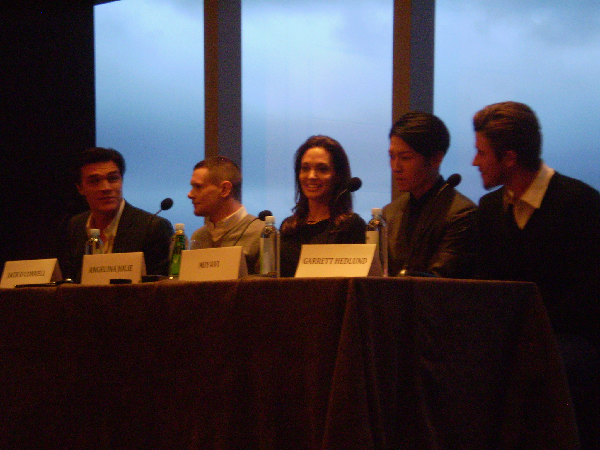
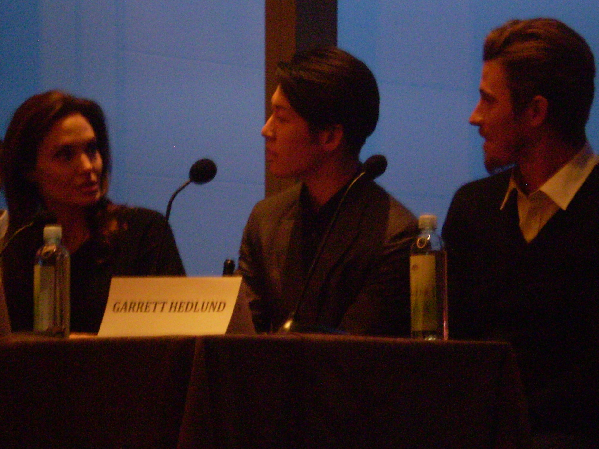
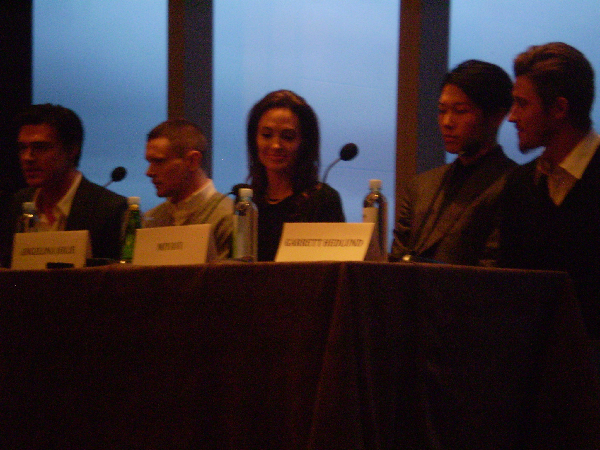
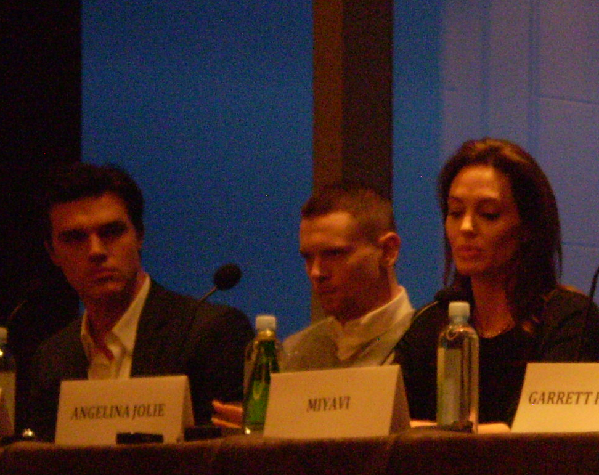
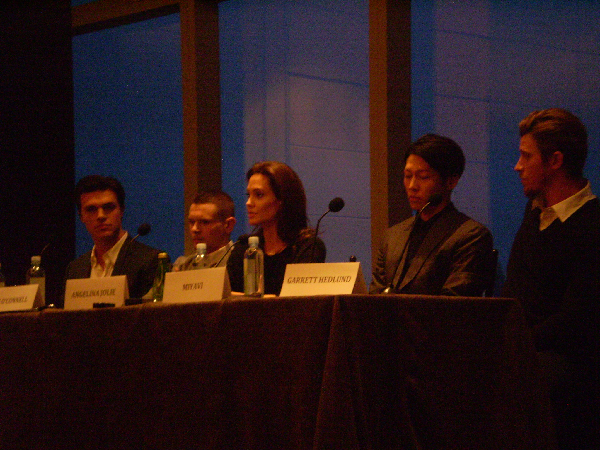
Written by: Karen Benardello
